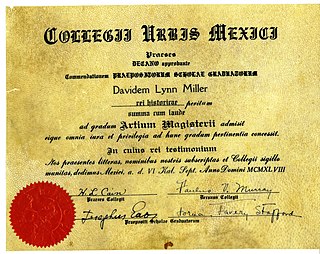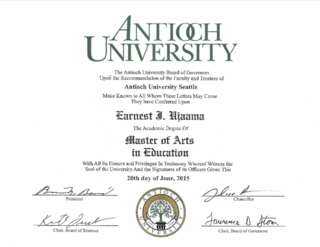A Master in Biochemistry (MBiochem or MBioch) degree is a specific master's degree for courses in the field of Biochemistry.
A Master in Biochemistry (MBiochem or MBioch) degree is a specific master's degree for courses in the field of Biochemistry.
In the UK, the MBiochem degree is an undergraduate award, available after pursuing a four-year course of study at a university. It is classed as a level 7 qualification in the National Qualifications Framework.
In Germany, the Master of Biochemistry is usually a graduate degree following a bachelor. It is offered by a few universities who have reorganized their teaching to be completely in English to better prepare for a scientific career that operates with English as its lingua franca. Examples are the Master of Biochemistry (M.Sc.) in Bochum and Tübingen.
In terms of course structure, MBiochem degrees have the same content that is usually seen in other degree programmes, i.e. lectures, laboratory work, coursework and exams each year. A substantial project is often undertaken in the fourth-year, which typically involves independent research. At the end of the second or third years, there is usually a threshold of academic performance in examinations to be reached to allow progression into the final year. Final results are awarded on the standard British undergraduate degree classification scale.

Postgraduate education, graduate education, or graduate school consists of academic or professional degrees, certificates, diplomas, or other qualifications usually pursued by post-secondary students who have earned an undergraduate (bachelor's) degree.

A Bachelor of Arts is the holder of a bachelor's degree awarded for an undergraduate program in the liberal arts, or, in some cases, other disciplines. A Bachelor of Arts degree course is generally completed in three or four years, depending on the country and institution.
A bachelor's degree or baccalaureate is an undergraduate degree awarded by colleges and universities upon completion of a course of study lasting three to six years. The two most common bachelor's degrees are the Bachelor of Arts (BA) and the Bachelor of Science. In some institutions and educational systems, certain bachelor's degrees can only be taken as graduate or postgraduate educations after a first degree has been completed, although more commonly the successful completion of a bachelor's degree is a prerequisite for further courses such as a master's or a doctorate.

Undergraduate education is education conducted after secondary education and before postgraduate education, usually in a college or university. It typically includes all postsecondary programs up to the level of a bachelor's degree. For example, in the United States, a student pursuing an associate or bachelor's degree is known as an undergraduate student while a student pursuing a master's or doctoral degree is a graduate student. Upon completion of courses and other requirements of an undergraduate program, the student would earn the corresponding degree. In some other educational systems, undergraduate education is postsecondary education up to and including the level of a master's degree; this is the case for some science courses in Britain and some medicine courses in Europe.

A Master of Science is a master's degree. In contrast to the Master of Arts degree, the Master of Science degree is typically granted for studies in sciences, engineering and medicine and is usually for programs that are more focused on scientific and mathematical subjects; however, different universities have different conventions and may also offer the degree for fields typically considered within the humanities and social sciences. While it ultimately depends upon the specific program, earning a Master of Science degree typically includes writing a thesis.

A thesis, or dissertation, is a document submitted in support of candidature for an academic degree or professional qualification presenting the author's research and findings. In some contexts, the word thesis or a cognate is used for part of a bachelor's or master's course, while dissertation is normally applied to a doctorate. This is the typical arrangement in American English. In other contexts, such as within most institutions of the United Kingdom and Republic of Ireland, the reverse is true. The term graduate thesis is sometimes used to refer to both master's theses and doctoral dissertations.

A diploma is a document awarded by an educational institution testifying the recipient has graduated by successfully completing their courses of studies. Historically, it has also referred to a charter or official document of diplomacy.
The system of academic degrees at the University of Oxford originates in the Middle Ages and has evolved since the university's founding in 1096.

The British undergraduate degree classification system is a grading structure used for undergraduate degrees or bachelor's degrees and integrated master's degrees in the United Kingdom. The system has been applied, sometimes with significant variation, in other countries and regions.
A medical school is a tertiary educational institution, professional school, or forms a part of such an institution, that teaches medicine, and awards a professional degree for physicians. Such medical degrees include the Bachelor of Medicine, Bachelor of Surgery, Master of Medicine, Doctor of Medicine (MD), or Doctor of Osteopathic Medicine (DO). Many medical schools offer additional degrees, such as a Doctor of Philosophy (PhD), master's degree (MSc) or other post-secondary education.
Latin honors are a system of Latin phrases used in some colleges and universities to indicate the level of distinction with which an academic degree has been earned. The system is primarily used in the United States. It is also used in some Southeastern Asian countries with European colonial history, such as Indonesia and the Philippines, and African countries such as Zambia and South Africa, although sometimes translations of these phrases are used instead of the Latin originals. The honors distinction should not be confused with the honors degrees offered in some countries, or with honorary degrees.
A Bachelor of Medicine, Bachelor of Surgery is a medical degree granted by medical schools or universities in countries that adhere to the United Kingdom's higher education tradition. Despite the historical distinction in nomenclature, these degrees are typically combined and conferred together. This degree is usually awarded as an undergraduate degree, but it can also be awarded at graduate-level medical institutions. The typical duration for completion is five to six years.
Bachelor of Philosophy is the title of an academic degree in philosophy that usually involves considerable research, either through a thesis or supervised research projects. Unlike many other bachelor's degrees, the BPhil is typically awarded to individuals who have already completed a traditional undergraduate degree.
A number of professional degrees in dentistry are offered by dental schools in various countries around the world.
A Master of Letters degree is a postgraduate degree.

A Master of Arts is the holder of a master's degree awarded by universities in many countries. The degree is usually contrasted with that of Master of Science. Those admitted to the degree have typically studied subjects within the scope of the humanities and social sciences, such as history, literature, languages, linguistics, public administration, political science, communication studies, law or diplomacy; however, different universities have different conventions and may also offer the degree for fields typically considered within the natural sciences and mathematics. The degree can be conferred in respect of completing courses and passing examinations, research, or a combination of the two.
A Master of Physics honours (or MPhys (Hons)) degree is a specific master's degree for courses in the field of physics.
Master's degrees in Europe are the second cycle of the Bologna process, following on from undergraduate bachelor's degrees and preceding third cycle doctorates. Master's degrees typically take two years to complete, although the number of years varies between countries, and correspond to 60 – 120 ECTS credits. Within the European Higher Education Area, representing almost all countries in Europe, master's degrees are referenced to the Framework of Qualifications for the European Higher Education Area and national qualifications frameworks.
A Master of Chemistry degree is a specific master's degree for courses in the field of Chemistry.

A Bachelor of Science is a bachelor's degree that is awarded for programs that generally last three to five years.